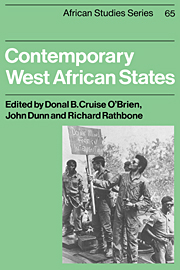5 - Côte d'Ivoire
Analysing the crisis
Published online by Cambridge University Press: 10 December 2009
Summary
In contrast with the situation in the majority of African countries, the Ivory Coast until the end of the 1970s achieved an economic growth of the order of 7 per cent per year (and this without any mineral resources). This was obtained by an expansion of the economic orientations inherited from colonial rule. The years 1977/8 marked the high point of an economic boom that had been maintained until then by the price explosion of coffee and cocoa on the world market. Ivorian ruling circles appear from the mid-1970s to have been seized by a financial euphoria which led to a substantial inflation in public investments. Large agricultural development operations were launched and managed by a rapidly expanding public enterprise sector. This expansion was accompanied by an apparent concern to redistribute the fruits of this growth according to region, with some particularly extravagant consumption propensities and an expensive policy of infrastructure creation and capital goods purchases. This unbridled expansion was bound to increase the country's foreign debt, as a large chunk of the investment financing came from Western banks. The deterioration of some balance of payments items (services, transfers) ensued as the heavy equipment installed during this fever meant increased imports.
- Type
- Chapter
- Information
- Contemporary West African States , pp. 59 - 74Publisher: Cambridge University PressPrint publication year: 1990

